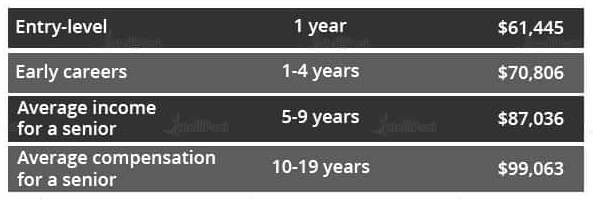
- Current Job Market for Power BI Professionals in India
- Average Salary Ranges for Different Experience Levels
- Impact of Certifications on Salary
- Regional Variations in Compensation
- Comparison with Other BI Tools Professionals
- Roles and Responsibilities Affecting Pay
- Freelancing vs. Full-time Positions
- Benefits and Perks Commonly Offered
Current Job Market for Power BI Professionals in India
The job market for Power BI professionals in India is currently strong and growing, fueled by increasing demand for data-driven decision-making across industries. Organizations are actively seeking skilled Power BI developers to create interactive dashboards, perform data modeling, and integrate data from multiple sources. Salaries vary based on experience and location, with entry-level professionals earning around ₹3.5 to ₹6 lakhs per year, mid-level developers with 3 to 5 years of experience earning between ₹6 to ₹12 lakhs, and senior professionals commanding ₹12 lakhs or more annually. Key industries hiring Power BI experts include IT services, finance, and consulting, with major employers such as Capgemini, Wipro, Bajaj Finance, and Deloitte leading the way highlighting the value of Business Analyst Training in these sectors. Metropolitan cities like Bangalore, Mumbai, and Chennai serve as primary hubs offering the most opportunities and competitive salaries. In-demand skills include advanced DAX and M language for complex data modeling, SQL for data extraction, and familiarity with Azure services such as Azure Synapse and Azure Data Factory. Additionally, knowledge of Power Automate and Power Apps is becoming increasingly valuable for workflow automation and app development. Overall, the Power BI job market in India presents numerous opportunities for professionals with strong technical expertise and certifications, making it a promising career path with competitive compensation and growth potential.
.Do You Want to Learn More About Business Analyst? Get Info From Our Business Analyst Training Today!
Average Salary Ranges for Different Experience Levels
Average salary ranges for professionals vary significantly based on experience levels, reflecting the growth in skills, responsibilities, and expertise over time. Entry-level professionals, typically with less than two years of experience, often earn salaries on the lower end of the spectrum as they build foundational knowledge and develop practical skills. These roles might involve more supervised tasks and learning opportunities, with salaries reflecting their junior status. Mid-level professionals, usually with three to five years of experience, command higher salaries due to their increased proficiency and ability to manage more complex projects independently an important consideration when deciding Which Certification is Right for You: Six Sigma or Lean Six. At this stage, individuals often take on greater responsibilities, such as leading smaller teams or projects, and contribute to strategic decision-making. Their compensation reflects the value they bring through enhanced problem-solving and technical skills. Senior-level professionals, with over five years of experience, typically receive the highest salary ranges. They are expected to possess deep domain expertise, leadership capabilities, and a track record of delivering significant business impact.

Senior roles may involve managing large teams, driving organizational strategy, and mentoring junior staff. Salaries at this level often include additional incentives like bonuses or stock options, rewarding their critical contributions. Industry, location, and company size also influence salary ranges across experience levels. Generally, as professionals advance in their careers, their earning potential grows substantially, making experience a key factor in compensation negotiations and career planning. Understanding these salary trends helps individuals set realistic expectations and plan for long-term career growth.
Impact of Certifications on Salary
- Increased Earning Potential: Certifications often lead to higher salaries because they validate specialized skills and knowledge that employers value, making certified professionals more competitive in the job market.
- Industry Recognition: Holding industry-recognized certifications signals to employers that you meet established standards of competence, which can justify salary increases or better compensation packages.
- Better Job Opportunities: Certified professionals are more likely to qualify for higher-paying roles and advanced positions, as many organizations require or prefer candidates with relevant certifications.
- Negotiation Advantage: Certifications provide concrete proof of expertise during salary negotiations, allowing professionals to confidently request higher pay based on verified skills, as emphasized in Books To Read For a Six Sigma Certification.
- Salary Differentials by Certification: The impact on salary varies depending on the certification’s relevance, demand, and difficulty. Certifications in trending technologies or high-demand fields often yield more significant salary boosts.
- Improved Career Growth: Beyond immediate salary benefits, certifications can open doors to promotions and leadership roles, which typically come with increased compensation.
- Long-Term Investment: While certifications may require time and financial investment upfront, the return on investment is often seen in higher lifetime earnings and greater job security.
- Cost of Living Differences: Salaries often vary by region to reflect local living costs. Areas with higher housing, transportation, and daily expenses typically offer higher compensation to maintain employees’ purchasing power.
- Demand and Supply of Talent: Regions with a strong demand for certain skills but limited supply of qualified professionals tend to offer higher salaries to attract and retain talent.
- Industry Concentration: Compensation levels are influenced by the concentration of industries in a region, a factor often discussed in Business Analyst Training.
- Economic Conditions: Regional economic health affects salary ranges. Wealthier regions or countries with strong economies can afford to pay employees more compared to areas facing economic challenges.
- Taxation and Benefits: Variations in tax rates and employee benefit requirements can impact take-home pay, influencing overall compensation packages offered in different regions.
- Company Size and Market Presence: Larger companies or multinational corporations based in certain regions may offer higher salaries compared to smaller firms in less competitive areas.
- Remote Work Influence: The rise of remote work has begun to blur regional salary differences, though many companies still adjust pay based on an employee’s location to reflect local market conditions.
- Job Complexity: Roles that require advanced technical skills, decision-making, and problem-solving tend to offer higher pay due to the expertise and experience needed to perform effectively.
- Level of Responsibility: Positions with greater accountability, such as managing teams, projects, or budgets, generally command higher salaries because they directly impact business outcomes.
- Scope of Influence: Jobs that affect larger parts of an organization or have a broad impact on operations or strategy typically come with increased compensation to reflect their importance an insight valuable for those learning How to Build a Successful Data Analyst Career.
- Required Experience and Education: Roles demanding extensive experience or specialized education often offer better pay, as these qualifications suggest a higher capability to handle complex tasks.
- Risk and Pressure: Positions involving high risk, tight deadlines, or significant pressure may provide higher compensation as a trade-off for the increased stress and responsibility.
- Market Demand for Skills: If a role requires skills that are in high demand but short supply, salaries tend to be higher to attract and retain qualified candidates.
- Leadership and Management Duties: Jobs that include leadership responsibilities, mentoring, or organizational strategy development typically come with increased pay due to their critical role in driving company success.
Would You Like to Know More About Business Analyst? Sign Up For Our Business Analyst Training Now!
Regional Variations in Compensation

Comparison with Other BI Tools Professionals
Comparing Power BI professionals with those skilled in other Business Intelligence (BI) tools highlights both unique strengths and overlapping capabilities within the BI landscape. Power BI is widely recognized for its user-friendly interface, seamless integration with Microsoft products, and robust data visualization capabilities, making it a popular choice among organizations already invested in the Microsoft ecosystem. Professionals proficient in Power BI often excel in creating interactive dashboards, leveraging DAX for advanced calculations, and integrating data from diverse sources with ease. In contrast, professionals skilled in tools like Tableau are often praised for their advanced visual storytelling and ability to handle complex visualizations with great customization, skills that complement knowledge gained from What is SAP Certification. Tableau experts typically focus on intuitive drag-and-drop functionalities and visual analytics, which appeal to users seeking deep exploratory data analysis. Similarly, QlikView and Qlik Sense specialists bring strengths in associative data modeling and in-memory processing, offering unique approaches to data discovery and interactive analysis. While Power BI professionals benefit from tight integration with Azure and Office 365, enabling streamlined collaboration and cloud analytics, professionals using other tools may have expertise in multi-platform environments or specialized industries. Each BI tool has its own learning curve, community support, and deployment flexibility, influencing career opportunities and salary expectations. Ultimately, the choice between Power BI and other BI tools depends on organizational needs, existing infrastructure, and personal career goals. Skilled BI professionals often enhance their versatility and marketability by gaining proficiency in multiple tools, adapting to diverse analytics environments to maximize business impact.
Gain Your Master’s Certification in Business Intelligence by Enrolling in Our Business Intelligence Master Program Training Course.
Roles and Responsibilities Affecting Pay
Freelancing vs. Full-time Positions
Freelancing and full-time positions each offer distinct advantages and challenges, making them suitable for different career goals and lifestyles. Freelancing provides flexibility and autonomy, allowing professionals to choose their projects, set their schedules, and work from anywhere. This freedom appeals to those who value independence and variety in their work. Freelancers can often take on multiple clients simultaneously, potentially increasing their income, but they also bear the responsibility for finding work, managing finances, and handling taxes. In contrast, full-time positions offer stability and predictability, including a regular paycheck, benefits like health insurance and retirement plans, and opportunities for career advancement within an organization. Full-time roles often provide structured work environments, clearer responsibilities, and access to professional development resources, aligning with principles from What is the ASAP Methodology. Employees benefit from job security and support from colleagues and management but may have less flexibility regarding work hours and project choices. Financially, full-time positions typically guarantee steady income, while freelancers face income variability depending on client availability and market demand. Freelancers must also handle their own benefits, which can be costly and complex. On the other hand, freelancers enjoy the potential to set higher hourly rates and diversify their skill sets by working across industries. Choosing between freelancing and full-time employment depends on personal priorities such as work-life balance, income stability, career growth, and risk tolerance. Both paths offer valuable experiences, and some professionals may even blend the two by freelancing alongside full-time jobs or transitioning between them throughout their careers.
Are You Preparing for Business Analyst Jobs? Check Out ACTE’s Business Analyst Interview Questions and Answers to Boost Your Preparation!
Benefits and Perks Commonly Offered
Benefits and perks are important components of a total compensation package that enhance employee satisfaction and well-being beyond just the base salary. Common benefits offered by employers include health insurance, which often covers medical, dental, and vision care, providing essential support for employees and their families. Retirement plans, such as 401(k) or pension schemes, help employees save for the future, often with employer matching contributions. Paid time off, including vacation days, sick leave, and holidays, allows employees to rest and recharge, contributing to better work-life balance. Many companies also provide flexible working arrangements like remote work options or flexible hours, which have become increasingly popular for improving job satisfaction and productivity topics often discussed in Business Analyst Training. Professional development opportunities, such as training programs, certifications, and tuition reimbursement, are offered to support career growth and skill enhancement. Wellness programs that include gym memberships, mental health resources, or wellness challenges promote overall health and reduce stress. Other perks can include employee discounts, commuter benefits, childcare assistance, and company-sponsored social events or team-building activities. These extras foster a positive workplace culture and strengthen employee engagement. Overall, benefits and perks play a crucial role in attracting and retaining talent by addressing employees’ diverse needs and preferences. A well-rounded benefits package can significantly boost morale, loyalty, and productivity, making it a valuable part of any employer’s compensation strategy.


